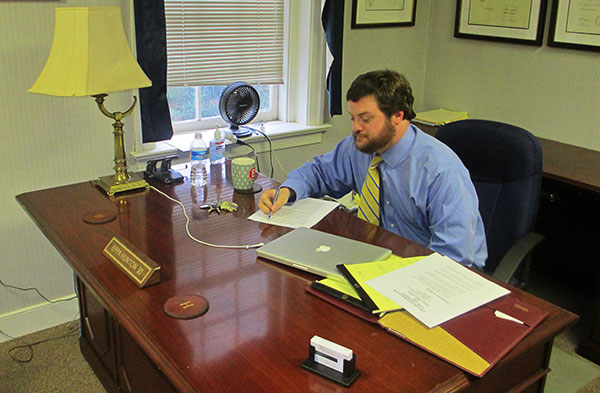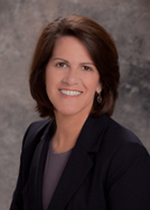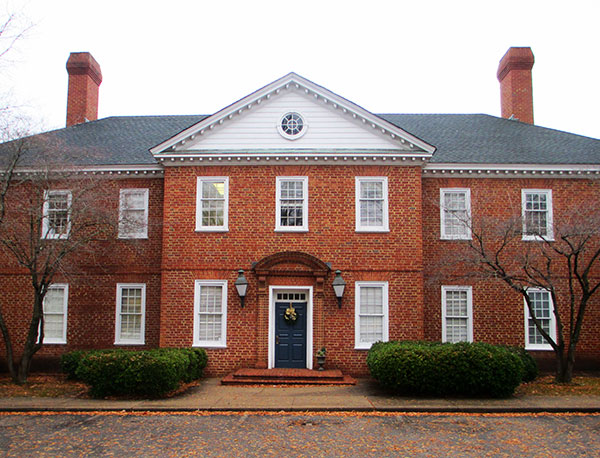
Eppa Hunton VI works at his Richmond Legal Development Center office. (Photo by Brandy Brubaker)
A handful of local lawyers are getting some help as they hatch their own businesses.
The Richmond Legal Development Center opened this summer as the state’s first incubator for new attorneys. Participants learn how to run their own practices, receiving advice from established lawyers and getting tips on tax planning, billing practices and holding money in escrow accounts.
“Starting a practice is essentially starting a business, and there are no business classes in law school,” said Eppa Hunton VI, one of the center’s first participants.
Each attorney pays $350 a month in rent to start, which covers a furnished office, utilities and the use of several common areas on the second floor of Picard Rowe & Rosen at 8310 Midlothian Turnpike.

Barbara Picard
Barbara Picard and her legal partner own the building Picard Rowe & Rosen calls home. After reorganizing, the firm no longer needed the second floor, and Picard saw an opportunity to start the incubator. The program is one of only 13 or 14 legal incubators in the country, she said.
So far, Picard has funded the program with her own money, rent income and donations of services or supplies. She hopes a local law school or bar association might eventually sponsor it.
The center’s attorneys work like any other lawyers would: They meet with clients, write legal documents and go to court. But they can also call on a group of more than 20 local attorneys who answer questions, give guidance or collaborate on cases, and they attend weekly training seminars that often focus on the business side of owning a law practice.
Attorneys will stay with RLDC for one year, Picard said. Then they will go out on their own, continuing to practice law solo, perhaps, or getting a job with an established firm or business. They might even opt to start a firm with their fellow RLDC lawyers.
Five new attorneys will then be selected. Picard said she would like to increase that number as the program grows.

The Picard Rowe & Rosen at 8310 Midlothian Tpke.
In addition to Hunton, the center’s inaugural participants are Mary Ashby Brown, Samantha Upton, Dan Anderson and Chris Padgett. The center found the participants through word of mouth. All graduated law school within the past six years, although most finished in 2011 or 2012.
Each has an individual practice and website and sets his or her own rates. Anderson said he charges $150 an hour, although he will negotiate a flat fee for more complicated cases. A veteran attorney often charges much more. Picard’s hourly rate, for example, is $350.
This group’s leases expire at the end of October, and the center hopes to have its new attorneys in place by then. Picard said referrals and inquiries are welcome.

Eppa Hunton VI works at his Richmond Legal Development Center office. (Photo by Brandy Brubaker)
A handful of local lawyers are getting some help as they hatch their own businesses.
The Richmond Legal Development Center opened this summer as the state’s first incubator for new attorneys. Participants learn how to run their own practices, receiving advice from established lawyers and getting tips on tax planning, billing practices and holding money in escrow accounts.
“Starting a practice is essentially starting a business, and there are no business classes in law school,” said Eppa Hunton VI, one of the center’s first participants.
Each attorney pays $350 a month in rent to start, which covers a furnished office, utilities and the use of several common areas on the second floor of Picard Rowe & Rosen at 8310 Midlothian Turnpike.

Barbara Picard
Barbara Picard and her legal partner own the building Picard Rowe & Rosen calls home. After reorganizing, the firm no longer needed the second floor, and Picard saw an opportunity to start the incubator. The program is one of only 13 or 14 legal incubators in the country, she said.
So far, Picard has funded the program with her own money, rent income and donations of services or supplies. She hopes a local law school or bar association might eventually sponsor it.
The center’s attorneys work like any other lawyers would: They meet with clients, write legal documents and go to court. But they can also call on a group of more than 20 local attorneys who answer questions, give guidance or collaborate on cases, and they attend weekly training seminars that often focus on the business side of owning a law practice.
Attorneys will stay with RLDC for one year, Picard said. Then they will go out on their own, continuing to practice law solo, perhaps, or getting a job with an established firm or business. They might even opt to start a firm with their fellow RLDC lawyers.
Five new attorneys will then be selected. Picard said she would like to increase that number as the program grows.

The Picard Rowe & Rosen at 8310 Midlothian Tpke.
In addition to Hunton, the center’s inaugural participants are Mary Ashby Brown, Samantha Upton, Dan Anderson and Chris Padgett. The center found the participants through word of mouth. All graduated law school within the past six years, although most finished in 2011 or 2012.
Each has an individual practice and website and sets his or her own rates. Anderson said he charges $150 an hour, although he will negotiate a flat fee for more complicated cases. A veteran attorney often charges much more. Picard’s hourly rate, for example, is $350.
This group’s leases expire at the end of October, and the center hopes to have its new attorneys in place by then. Picard said referrals and inquiries are welcome.


